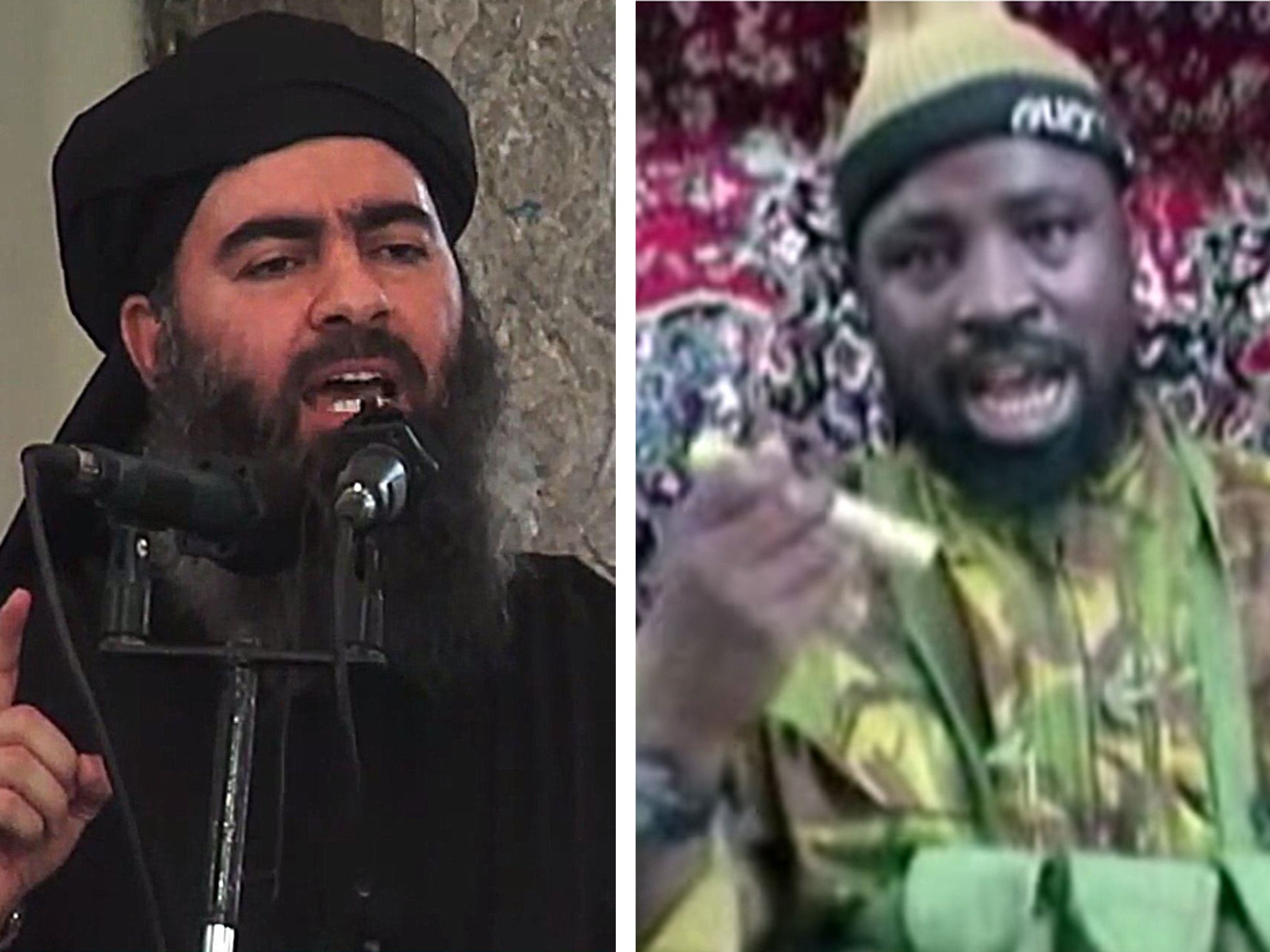Abubakar Shekau and Abu Bakr al-Baghdadi: What unites the Islamic extremist Boko Haram and Isis leaders?
Nigerian Boko Haram pledged allegiance to Isis this weekend, but what have the leaders got in common besides the obvious?

Your support helps us to tell the story
From reproductive rights to climate change to Big Tech, The Independent is on the ground when the story is developing. Whether it's investigating the financials of Elon Musk's pro-Trump PAC or producing our latest documentary, 'The A Word', which shines a light on the American women fighting for reproductive rights, we know how important it is to parse out the facts from the messaging.
At such a critical moment in US history, we need reporters on the ground. Your donation allows us to keep sending journalists to speak to both sides of the story.
The Independent is trusted by Americans across the entire political spectrum. And unlike many other quality news outlets, we choose not to lock Americans out of our reporting and analysis with paywalls. We believe quality journalism should be available to everyone, paid for by those who can afford it.
Your support makes all the difference.Despite the fact their terrorist networks dominate the headlines, little is known about either man. It's no surprise that it's a passionate hatred of Western values that has united the two leaders from the Middle East and West Africa, but Boko Haram leader Abubakar Shekau and Isis leader Abu Bakr al-Baghdadi also have a thirst for fame and an abundance of death rumours in common.
Death rumours
Boko Haram leader Shekau is said to have been killed by Nigerian and Cameroonian forces several times, and it was widely rumoured that Isis' Baghdadi was dead at the end of 2014. However, both seem to be alive and well.
Shekau is thought to use several body doubles, perhaps explaining why the army were so confident he was dead. His last reported killing was in September 2014, but a video obtained by Agence Presse-France appeared to show Shekau gloating: "Here I am, alive... I will only die the day Allah takes my breath."
However, some experts believe there are several men posing as Shekau. The Terrorism Research & Analysis Consortium (Trac) believe that there are discrepancies between Shekau from video to video. "Even though the mannerisms and facial hair are similar in each of the videos below, in some cases he appears much heavier or much darker in skin color, and the posturing is very different between each man," it found.
In November 2014, it was similarly reported by Iraqi media that Baghdadi had been killed or severely injured in a US-led airstrike. Even British forces were unsure, with General Nicholas Houghton, Chief of Defence Staff of the British Armed Forces telling the Daily Mail: "I can't absolutely confirm that Baghdadi has been killed. Probably it will take some days to have absolute confirmation."
Both leaders have reveled in their status as "indestructible", with Isis emphasising that the death of a leader didn't mean the end of the regime.
A Twitter account linked to Isis spokesperson Abu Mohammed al-Adnani said: "Do you believe that the caliphate will end by the martyrdom of the caliph? We reassure the nation that its emir Abu Bakr al-Baghdadi is fine, thanks be to Allah. Pray for his speedy recovery."
'Ordinary' students
Both Shekau and Baghdadi studied Islamic teachings, although one was a much better student than the other.
Shekau, who personally took the "credit" for kidnapping 400 schoolgirls, was described as "an easy-going fellow who would exchange banter with people in the neighbourhood. He was popular... a local theology student".
However, Baghdadi was marked out for being an average pupil - he was unable to get in to law school in Baghdad because his grades were too low. However, in 1999 he earned a PhD in Islamic theology after eight years of studying.
Both have great experience preaching, with Baghdadi preaching and teaching at mosques before apparently leading small militant groups.
Cult of personality
Shekau has a distinctive and intense delivery style, which has been described by some US commentators as a sign of poor mental health.
"Any impartial observer — especially those who have watched his public statements over the years— would be left wondering about Shekau's mental state, especially after his most recent video appearance," NBC News reported a "senior US counter-terrorism expert" as saying.
Shekau has reportedly been institutionalised for mental-health difficulties in the past. Trac have described him as "mad", and said he's "rumoured to have escaped from the Federal Neuropsychiatric Hospital in Maiduguri during the 1990s".
Associated Press report that a local, Butari Gwoni, said Shekau first married the daughter of a teacher, but his wife died in childbirth, triggering what some said was a latent mental illness.
In contrast to Shekau's frenetic style, Baghdadi has carved out a public persona as more of an intellectual, according to analysts. His true personality is kept under wraps and beyond his past interest in football, little is known about what he's like on a day-to-day basis.
Fame obsessed
Both have a burning desire for celebrity. While they are evasive - it's been rumoured that Baghdadi wears masks while delivering his messages - Shekau and Baghdadi are both hot on social media, regularly updating their followers with videos and press releases, and Shekau even runs his own personal Twitter account.